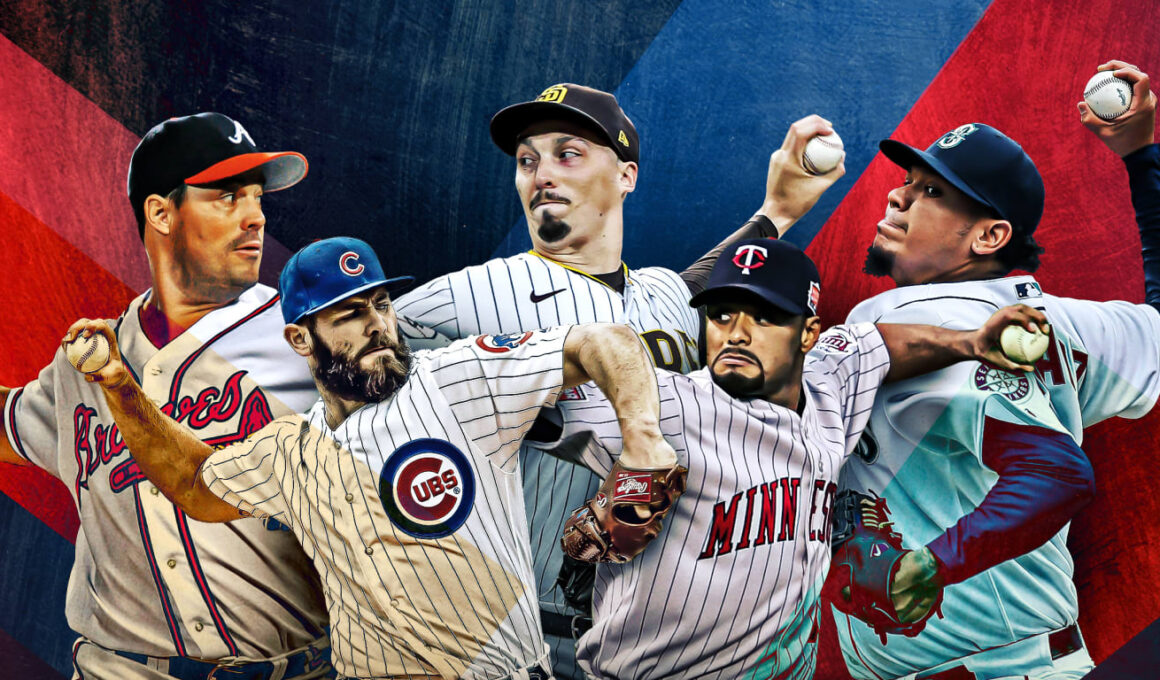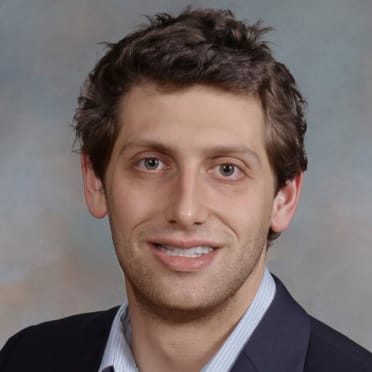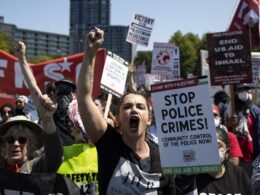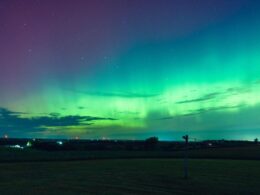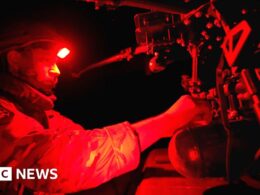These players went from All-Star snubs to Cy Young winners
It’s an incredible honor to be named to the All-Star Game, but not all hope is lost if a player doesn’t do so. MLB.com’s Jason Foster already dove into this, analyzing the AL/NL MVP winners who weren’t named All-Stars in that given season. The natural follow-up, then, is to look at MLB’s other extremely prominent individual regular season award. How many Cy Young Award winners weren’t All-Stars in the same season?
Two players have done this in the past three seasons alone, in Blake Snell last year and Robbie Ray two years before that. Among the players with a realistic chance to do so this year are Ronel Blanco, Justin Steele and Jack Flaherty, with Luis Castillo and Joe Ryan being long shots. If any of them can pull it off, they will join some strong company.
Since the first All-Star Game in 1933, there have been 22 players who missed the Midsummer Classic but ended up with Cy Young honors later that year, with two of those 22 doing it multiple times. Below, we list them in reverse chronological order. Note that we aren’t including the 2020 season, as there was no All-Star Game that year.
2023: Blake Snell, Padres
Snell is a two-time Cy Young Award winner, but he was named an All-Star the first time he won the award in 2018 with the Rays. In 2023, he surged to Cy Young status with a remarkable second half, going 10-2 with a 1.35 ERA across 16 starts from July 1 onward.
2021: Robbie Ray, Blue Jays
Ray has still only made one All-Star Game in his career, and that came four years before his Cy Young season, in 2017 with Arizona. In 2021, Ray had a 2.35 ERA and an impressive 129 strikeouts in 99 2/3 innings pitched after the All-Star break.
2016: Rick Porcello, Red Sox
Porcello is one of three Cy Young-winning pitchers who never made an All-Star Game in his career. The 2016 season was somewhat of an anomaly for Porcello, who finished with a career-low 3.15 ERA. He had an ERA of at least 3.95 in 10 of his 12 MLB seasons.
2015: Jake Arrieta, Cubs
Arrieta’s numbers were already pretty strong entering the 2015 All-Star break, with a 10-5 record and 2.66 ERA. But his post-ASG portion of the season was outright legendary. In 15 starts after the break, he was 12-1 with a miniscule 0.75 ERA.
2014: Corey Kluber, Cleveland
Kluber ended up winning a second Cy Young Award in 2017, but his first came in 2014. That year, he went 9-3 with a 1.73 ERA in 14 starts after the break, throwing at least eight innings in half of those starts.
2010: Félix Hernández, Mariners
Interestingly, Hernández won one Cy Young Award in his career, and that award came during the only season from the span of 2009-15 in which he wasn’t an All-Star. That year, he had a 1.53 ERA and .542 OPS allowed in 15 starts after the break.
2004: Johan Santana, Twins
Santana made four All-Star teams from 2005-09, but he was not an All-Star in his breakout 2004 season. Santana went 13-0 with a 1.21 ERA after the All-Star break in 2004 — the most wins, without a loss, by any player after the All-Star break in AL/NL history.
1996: Pat Hentgen, Blue Jays
Hentgen was the definition of a workhorse in 1996, finishing the season as MLB’s leader in complete games (10), innings pitched (265 2/3) and batters faced (1,100). After the All-Star break, he went 12-4 with a 2.58 ERA.
1993: Greg Maddux, Braves
Maddux had a legendary run of four consecutive Cy Young seasons from 1992-95, tied with Randy Johnson (1999-2002) for the longest streak in MLB history. 1993 was the only one of those seasons in which Maddux wasn’t an All-Star, despite entering the break with a 2.83 ERA.
1990: Doug Drabek, Pirates
Drabek, whose lone career All-Star season came four years later with the Astros, closed the 1990 season with a bang. He had a 13-2 record and 2.29 ERA after the All-Star break, including three complete game wins in the month of September alone.
1989 and 1985: Bret Saberhagen, Royals
As a 21-year-old phenom in 1985, Saberhagen went 13-2 with a 2.60 ERA and seven complete games from July 1 onward. Four years later, he ended the season with a preposterous run. Over the 22-day span from September 9-30, Saberhagen went 6-0 in six starts, with 48 innings pitched and only three earned runs allowed. Those were the only two Cy Young Awards of his career.
1987: Roger Clemens, Red Sox
One year earlier, Clemens pulled off the trifecta, being an All-Star in addition to winning the AL Cy Young and MVP trophies. His start to the 1987 season wasn’t quite as hot, but he still finished with a career-high 18 complete games, en route to the second of his MLB-record seven Cy Young Awards.
1984: Rick Sutcliffe, Cubs
A June interleague trade between Cleveland and Chicago might have harmed Sutcliffe’s chances of being an All-Star. But he was so dominant with the Cubs that he won the NL Cy Young despite spending roughly two months in the AL. With the Cubs, he went 16-1 with a 2.69 ERA.
1983: LaMarr Hoyt, White Sox
Hoyt finished the 1983 season as MLB’s leader in wins (24) and WHIP (1.024), notably throwing six complete games from August to September. He later made one All-Star appearance in 1985.
1983: John Denny, Phillies
Like Porcello, Denny is one of three Cy Young-winning pitchers who never made an All-Star Game in his career. This was particularly perplexing for him, as his ERA before the All-Star break in 1983 (2.13) was actually lower than his post-break ERA (2.57).
1982: Pete Vuckovich, Brewers
Vuckovich is the third Cy Young-winning pitcher who was never an All-Star. And besides that, another similarity that Vuckovich shares with Denny is that Vuckovich also had a lower pre-ASG ERA in his Cy Young season (3.09) than post-ASG ERA (3.58).
1979: Mike Flanagan, Orioles
Flanagan made his lone career All-Star Game in 1978, but he won his lone career Cy Young Award one year later. After the All-Star break in 1979, Flanagan went 11-3 with a 2.24 ERA, including wins in eight straight starts from Aug. 9 to Sept. 13.
1978: Gaylord Perry, Padres
Perry was an All-Star during his first Cy Young season in 1972 with Cleveland, but that wasn’t the case in 1978. That year, though, he went 12-2 with a 2.36 ERA after the All-Star break to earn his second and final Cy Young Award.
1976 and 1973: Jim Palmer, Orioles
Palmer and Saberhagen are the only pitchers to have multiple seasons in which they won a Cy Young Award but weren’t All-Stars. Unlike Saberhagen, though, Palmer did have a separate season where he was both an All-Star and a Cy Young winner, doing so in 1975.
1969: Mike Cuellar, Orioles
Cuellar split the 1969 AL Cy Young Award with the Tigers’ Denny McLain. In 1969, Cuellar won each of his first seven starts after the All-Star break, and he ultimately finished 13-2 with a 2.24 ERA after the break.
1967: Mike McCormick, Giants
There was something special about San Francisco for McCormick. He was a two-time All-Star with the Giants from 1960-61. Across four seasons with the Orioles and Washington Senators (the current Rangers) from 1963-66, he was 25-32 with a 3.70 ERA. Then, in his first season back with the Giants in 1967, he had an NL-high 22 wins en route to a Cy Young trophy.
1956: Don Newcombe, Dodgers
It should be safe to say what Newcombe did will never be done again — and he did it in the first year the Cy Young Award existed. Not only did Newcombe win the Cy Young without being an All-Star, but he also remarkably was the NL MVP in the same season, thanks to his MLB-best 27 wins. He is the only pitcher ever to win MVP while not being an All-Star that year, let alone doing it while adding the Cy Young as a cherry on top.




